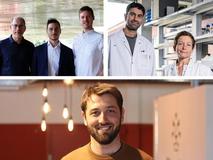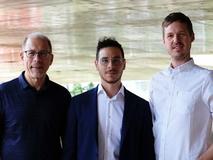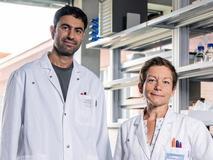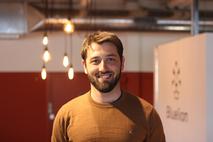CHF 40,000 for a technology to speed up drug discovery, an anti-parasite Drug Discovery Platform, and an AI-based software for building maintenance
28.09.2022
IsoSpec Analytics, NA Drug Discovery, and Seismohealth win Venture Kick's first stage of entrepreneurial and financial support. Their projects allow pharmaceutical companies to speed up the drug discovery and development phases by offering a faster and more reliable approach for biomolecular analysis, offer a digital therapy for erectile dysfunction that includes scientifically proven modules, and aim to revolutionize the maintenance and preservation of existing buildings and bridges and in doing so maximize their safe operational life.
 |
 IsoSpec Analytics co-founders, from left to right: scientific advisor Prof. Thomas Rizzo, CEO Dr. Ahmed Ben Faleh, and CTO Dr. Stephan Warnke
|
 NA Drug Discovery co-founders are Natacha Gaillard (on the right) and Ashwani Sharma, both PhDs, Senior Scientists at the Paul Scherrer Institute.
|
 Seismohealth: CEO Panagiotis Martakis
|
IsoSpec Analytics: accurate molecular biometrics for faster drug and biomarker discovery
Drug development is a long and costly process with only one in twenty drug candidates succeeding to reach the market. This low success rate is partly owed to insufficient drug characterization in the early stages. IsoSpec Analytics is a bioanalytical technology spin-off from the Ecole Polytéchnique Fédérale de Lausanne (EPFL) that aims at reducing failure rates for drugs in fields including oncology and neurodegenerative diseases. By providing key information during target validation and compound screening, and by helping decipher metabolic pathways, they are driving innovation in personalized medicine. Beyond pharmaceuticals, IsoSpec is developing its technology to become a tool of choice for early disease diagnostics by opening the door for the discovery of new biomarkers, attacking the disease at its root not at its symptoms. Additional market opportunities exist in food tech and agricultural science. The team is initially composed of CTO Dr. Stephan Warnke, scientific advisor Prof. Thomas Rizzo, and CEO Dr. Ahmed Ben Faleh as co-founders. They have co-developed the technology and its applications over the last 5 years. IsoSpec's patented technology will allow pharmaceutical companies to speed up the drug discovery and development phases by offering a faster and more reliable approach to biomolecular analysis. Their rapid separation and molecular infrared fingerprinting technology can eliminate bottlenecks, providing key information for optimal decision-making and development. They will initially provide advanced analytical services as a contract research organization, and at the same time develop their technology into a powerful, user-friendly instrument for pharmaceutical and medical laboratories.
IsoSpec Analytics estimates its total addressable market to be USD 8.5bn for the characterization of regulated products, while the demand for analytics in this field is expected to rapidly increase. The team is currently working on pilot projects with ten different companies ranging from small biotech startups to large multinationals in pharma and clinical nutrition.
The Venture Kick funds will allow the founding team to focus on business development and technological upgrades.
Seismohealth: Intelligent monitoring platform for buildings and bridges to maximize their safe operational life and prevent collapses.
The tragic collapse of the Genoa bridge in 2018 killed 43 people and exposed that we still fail to manage the risks in our built infrastructure: how long are buildings safe and how far can we trust visual inspections? Every second bridge and building in Europe has long exceeded its design life span and becomes older every day. Meanwhile, maintenance relies on visual inspections that are subjective, time-consuming, and often inconclusive, as they evaluate only the visible and accessible parts of the structures. In the aftermath of earthquakes, inspections need to be carried out, which leads to long business downtimes that can last even years. Massive retrofitting and replacing our aging infrastructure comes at an unbearable monetary and environmental cost, as 38% of the global CO2 emissions are already attributed to the construction industry.
The Seismohealth team aims to revolutionize the maintenance and preservation of existing buildings and bridges and in doing so maximize their safe operational life. Based on limited commercial vibration sensors, their intelligent algorithms provide real-time tracking of the global structural condition and customized tools for predictive maintenance planning. In case of disasters, they offer early warning alarms, as well as real-time assessment, significantly reducing business downtimes. In Switzerland, over 1 million buildings and 3000 bridges were built before the establishment of modern standards and potentially do not fulfill the current safety standards. Considering that 1% percent of the obsolete buildings and infrastructure must be monitored, they estimate annual addressable revenues of CHF 100 million. By extrapolating to the European infrastructure, the addressable market size exceeds CHF 5 billion.
In the next 6 months, they plan to complete the first release of their monitoring platform and deploy their solution in benchmark pilot projects in Switzerland, Greece and Kuwait. The financial support of Venture Kick will provide them with the necessary funds to achieve these goals. This will boost their visibility and enable Seismohealth to maximize the safe operational life of our built infrastructure and massively improve the resilience of our society in response to unpredictable disasters.
Drug development is a long and costly process with only one in twenty drug candidates succeeding to reach the market. This low success rate is partly owed to insufficient drug characterization in the early stages. IsoSpec Analytics is a bioanalytical technology spin-off from the Ecole Polytéchnique Fédérale de Lausanne (EPFL) that aims at reducing failure rates for drugs in fields including oncology and neurodegenerative diseases. By providing key information during target validation and compound screening, and by helping decipher metabolic pathways, they are driving innovation in personalized medicine. Beyond pharmaceuticals, IsoSpec is developing its technology to become a tool of choice for early disease diagnostics by opening the door for the discovery of new biomarkers, attacking the disease at its root not at its symptoms. Additional market opportunities exist in food tech and agricultural science. The team is initially composed of CTO Dr. Stephan Warnke, scientific advisor Prof. Thomas Rizzo, and CEO Dr. Ahmed Ben Faleh as co-founders. They have co-developed the technology and its applications over the last 5 years. IsoSpec's patented technology will allow pharmaceutical companies to speed up the drug discovery and development phases by offering a faster and more reliable approach to biomolecular analysis. Their rapid separation and molecular infrared fingerprinting technology can eliminate bottlenecks, providing key information for optimal decision-making and development. They will initially provide advanced analytical services as a contract research organization, and at the same time develop their technology into a powerful, user-friendly instrument for pharmaceutical and medical laboratories.
IsoSpec Analytics estimates its total addressable market to be USD 8.5bn for the characterization of regulated products, while the demand for analytics in this field is expected to rapidly increase. The team is currently working on pilot projects with ten different companies ranging from small biotech startups to large multinationals in pharma and clinical nutrition.
The Venture Kick funds will allow the founding team to focus on business development and technological upgrades.
NA Global: an anti-parasite Drug Discovery Platform
New and effective drugs against parasites are required, but the so-called “Drug development” costs too much, takes too long, and additionally, it fails way too often. NA Global, by empowering an innovative Parasite Drug Discovery Platform, will transform those problems into a unique business opportunity. Instead of screening thousands and millions of compounds to find one hit compound without target information, they start with a relatively tiny number of custom-designed drugs but with an extremely high success rate.
NA Global co-founders are Natacha Gaillard and Ashwani Sharma, both PhDs, Senior Scientists at the Paul Scherrer Institute. They will develop new drugs to help the fight against parasitic infections caused by parasites in Human Health, Animal Health and Agriculture. As an example, we can cite Malaria, Toxoplasma, and Cryptosporidium for human diseases or Eimiria and Theileria for animal diseases. By using their exclusive knowledge and know-how, the team has established a full pipeline to specifically design inhibitors of parasite tubulin, a well-known and validated target already used in cancer therapy. Their approach allows them to target a multitude of parasitic diseases, and their deep understanding of their drugs’ mechanism of action will enable the very fast development of alternative strategies in case of resistance development. Their expected market size is approx. USD 20 billion. This number includes human health, veterinary medicine, and agriculture.
They plan to use the Venture Kick funds to find the right partner to initiate the disease animal model studies for their first molecule: Parabulin. After their successful proof of principle, they want to validate their approach by generating more lead molecules. They will need for this the relevant funds to sustain their chemistry campaign. Finally, for strategic development, they need to team up with partners and develop their network of collaborations and customers. A lot of time and effort will be spent in this direction to ensure the long-term viability of their R&D efforts.
Seismohealth: Intelligent monitoring platform for buildings and bridges to maximize their safe operational life and prevent collapses.
The tragic collapse of the Genoa bridge in 2018 killed 43 people and exposed that we still fail to manage the risks in our built infrastructure: how long are buildings safe and how far can we trust visual inspections? Every second bridge and building in Europe has long exceeded its design life span and becomes older every day. Meanwhile, maintenance relies on visual inspections that are subjective, time-consuming, and often inconclusive, as they evaluate only the visible and accessible parts of the structures. In the aftermath of earthquakes, inspections need to be carried out, which leads to long business downtimes that can last even years. Massive retrofitting and replacing our aging infrastructure comes at an unbearable monetary and environmental cost, as 38% of the global CO2 emissions are already attributed to the construction industry.
The Seismohealth team aims to revolutionize the maintenance and preservation of existing buildings and bridges and in doing so maximize their safe operational life. Based on limited commercial vibration sensors, their intelligent algorithms provide real-time tracking of the global structural condition and customized tools for predictive maintenance planning. In case of disasters, they offer early warning alarms, as well as real-time assessment, significantly reducing business downtimes. In Switzerland, over 1 million buildings and 3000 bridges were built before the establishment of modern standards and potentially do not fulfill the current safety standards. Considering that 1% percent of the obsolete buildings and infrastructure must be monitored, they estimate annual addressable revenues of CHF 100 million. By extrapolating to the European infrastructure, the addressable market size exceeds CHF 5 billion.
In the next 6 months, they plan to complete the first release of their monitoring platform and deploy their solution in benchmark pilot projects in Switzerland, Greece and Kuwait. The financial support of Venture Kick will provide them with the necessary funds to achieve these goals. This will boost their visibility and enable Seismohealth to maximize the safe operational life of our built infrastructure and massively improve the resilience of our society in response to unpredictable disasters.


